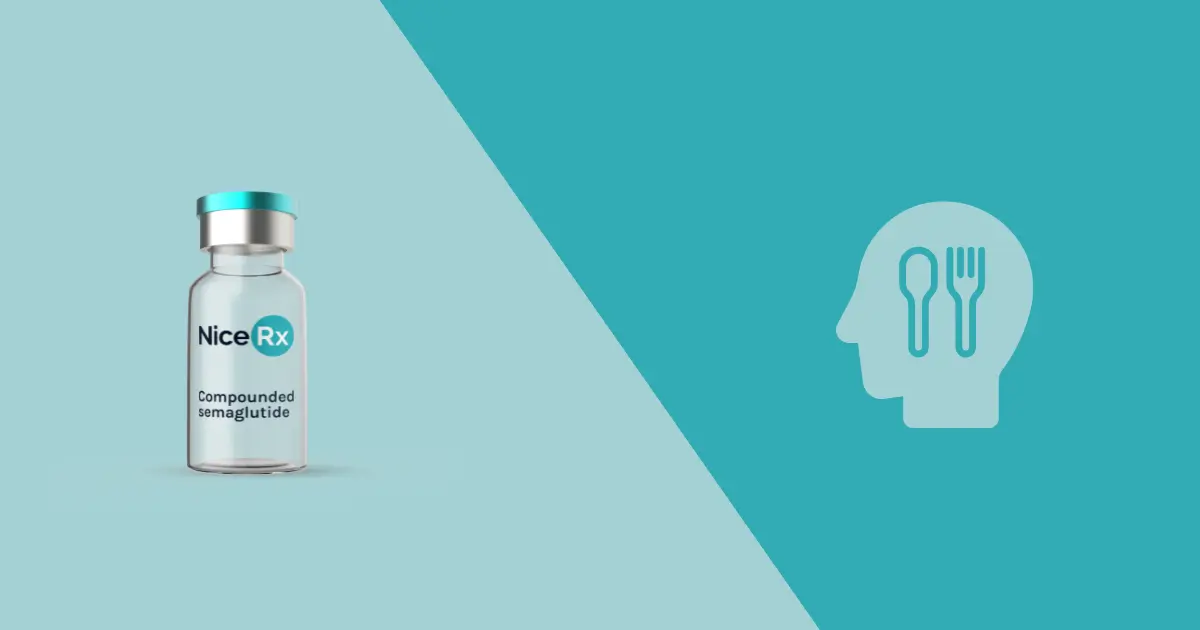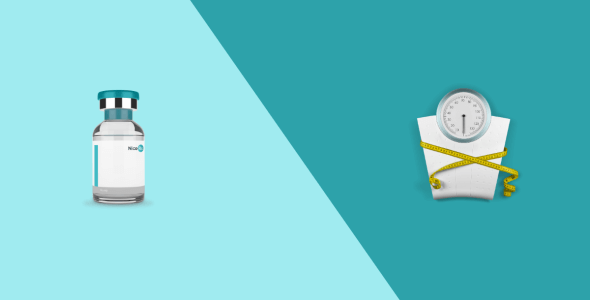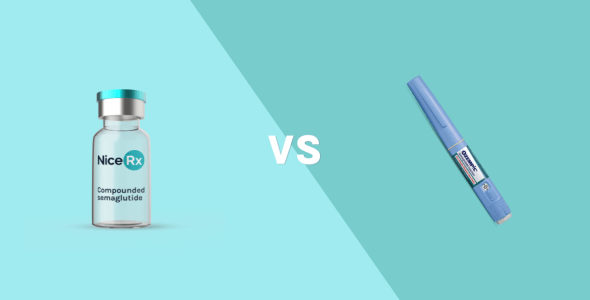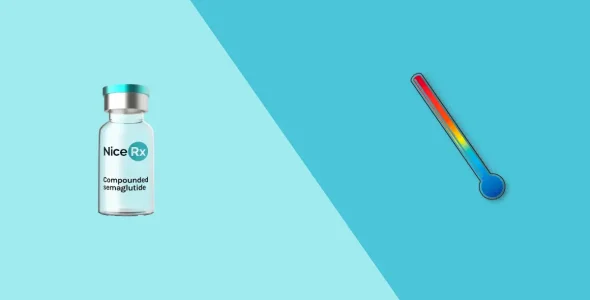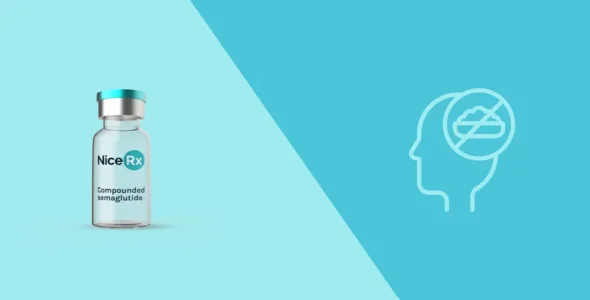Why am I still hungry on semaglutide? Here’s what to do
Still hungry on semaglutide? You’re not alone. Discover why cravings might linger (it’s not willpower!) and science-backed tricks to stay satisfied and on track with your weight loss journey.
Key highlights
- Semaglutide is supposed to reduce your appetite within 1-4 weeks of starting the medication, but it’s normal to feel still hungry while your body gets used to the medication.
- The medication does not completely get rid of your appetite. It suppresses your appetite and makes you feel full for longer.
- Improper dosage, poor food choices, irregular meal patterns, dehydration, insufficient sleep, stress, and lack of physical activity might be the reasons you still feel hungry.
- If you’re still feeling hungry after 4 weeks of using semaglutide, speak with your healthcare provider. They may decide to increase the dosage of your medication or check other underlying conditions that could be affecting the medication’s effectiveness.
Semaglutide is supposed to curb your appetite within 1-4 weeks of starting the medication, but if you are still feeling hungry, you’re not alone! Although it might be frustrating, it is normal to still feel hungry on semaglutide. There are various reasons for feeling hungry on semaglutide, such as improper doses, missing doses, lifestyle factors such as lack of physical activity and unhealthy diet, stress, lack of sleep, dehydration, and insufficient food intake.
Semaglutide works by mimicking the action of the naturally occurring hormone glucagon-like peptide-1 to suppress appetite and promote weight loss. It comes with three brand names: Ozempic, Wegovy, and Rybelsus. Wegovy is FDA-approved for weight loss in obese and overweight patients, while Ozempic and Rybelsus are approved for the management of type 2 diabetes. Ozempic can also be prescribed off-label for chronic weight management.
Semaglutide reduces your appetite and blood sugar levels over time. However, it is normal to feel hungry while taking the medication as it reduces appetite but does not get rid of it completely.
This article explores the reasons why some people may still feel hungry while on semaglutide, with practical solutions to manage your hunger levels and achieve your weight loss goals.
Why you might still be hungry on semaglutide
You might have heard that semaglutide suppresses appetite and makes you feel less hungry. However, some people don’t experience a significant difference in their appetite while on semaglutide therapy. It occurs due to various factors such as dosage of the medication, body mass index, metabolism, timing of meals, food choices, and hydration. Before exploring the causes, let’s explore how semaglutide works.
Semaglutide is a GLP-1 receptor agonist. These receptors are present in the pancreas and brain and are activated by a naturally occurring gut hormone, glucagon-like peptide-1. GLP-1 receptor agonists like semaglutide occupy these receptors to suppress appetite, reduce hunger pangs, slow gastric emptying, increase insulin release, and decrease glucagon secretion. This way, the medication promotes weight loss and blood sugar control.
According to research, semaglutide usually takes 1-4 weeks to suppress appetite and 8-12 weeks to promote glycemic control and weight loss, but it may take longer. If you experience persistent hunger while on semaglutide, here are a few reasons why you might still feel hungry when using compounded semaglutide, Ozempic or Wegovy:
Hunger won’t completely disappear
While semaglutide makes you feel less hungry, it will not make you never feel hungry. You should not expect “zero hunger” after taking the medication.
Semaglutide can slow down the rate at which your stomach empties by relaxing the muscles of your stomach. The food moves slowly into the intestine, and you feel fuller for a long time. However, hunger will not completely disappear. You will feel hungry again as soon as your stomach empties.
“Food noise” is a state in which your thoughts and actions revolve around food to make you feel happier. Semaglutide significantly reduces food noise. Moreover, the effect of the medication changes your preference or choice of foods. A research study suggests that semaglutide users have a reduced inclination toward sweet, palatable, and savoury foods, carbonated drinks, snacks, and processed foods.
Low doses may not suppress your appetite
The starting dosage of semaglutide is very low to reduce the risk of side effects and may not be sufficient to suppress appetite effectively for some people. You may need a higher dosage to experience a significant difference. To limit the side effects of the medication, semaglutide dosage is escalated and adjusted according to your body’s response to the medication over time.
Ozempic is titrated over 12-16 weeks. The standard dosage schedule of Ozempic is as follows:
- Starting dose of 0.25 mg once weekly for the first 4 weeks.
- 0.5 mg once weekly for the next 4 weeks if tolerated
- 1 mg once weekly for the next 4 weeks if tolerated
- Maximum dose of 2 mg once weekly ongoing if further dose escalation is required
Wegovy is titrated over 16-20 weeks. The standard dosage schedule of Wegovy is as follows:
- Starting dose of 0.25 mg once weekly for the first 4 weeks.
- 0.5 mg once weekly for the next 4 weeks if tolerated
- 1 mg once weekly for the next 4 weeks if tolerated
- 1.7 mg once weekly for the next 4 weeks if tolerated
- Maximum dose of 2.4 mg once weekly ongoing if further dose escalation is required
Your healthcare provider titrates the dosage according to your appetite, tolerance, weight changes, and potential of semaglutide side effects while your body gets used to the medication.
This dosage escalation period also means that it will take longer for you to experience the full effects of the medication, including feelings of less hunger, and you might feel that the lower doses of semaglutide won’t affect you as much as the higher doses.
Timing of meals
Ozempic, Wegovy and compounded semaglutide can be taken with or without food at any time of the same day each week. In its oral form (Rybelsus), it should be taken 30 minutes before meals to get maximum results.
Combine semaglutide with regular meal patterns for optimal results. Irregular meal patterns or eating too close to bedtime can interfere with appetite regulation. In addition, eating meals with irregular patterns disrupts metabolism, increases blood sugar levels and body mass index, and is associated with a greater risk of cardiovascular diseases such as high blood pressure. These factors affect the way semaglutide works and suppresses appetite. That is why meals should be taken at regular intervals to complement the effect of the medication.
Food choices
Your appetite while on semaglutide also depends on the choice of foods you consume. You might be eating less filling foods or eating less than the required amount of food. For example, processed foods make you feel hungry earlier than food rich in dietary fibers. Additionally, you might have become extra conscious about food intake. You may be eating less, which makes you feel hungry again after meals.
Consume a balanced diet with plenty of protein and dietary fiber to promote satiety and complement the effects of semaglutide. Highly processed foods, sugary drinks, or large amounts of unhealthy fats cause rapid spikes in blood sugar levels, which can override the effect of semaglutide and trigger hunger despite taking the medication.
Hydration
Dehydration can make you feel hungry. When you’re thirsty, your body may perceive thirst signals as hunger signals. Drinking water fills up the space in your stomach. When you do not drink enough water, the stomach doesn’t get full as fast, and you feel an urge to eat more. Additionally, water can make you feel full and satiated around meal times. Stay adequately hydrated throughout the day to get maximum appetite suppression with semaglutide.
A systematic review of the effect of hydration on hunger suggests that drinking liquids 30 to 120 minutes before meals results in less food intake during the meal.
Individual differences in response to the medication
Individual responses to semaglutide can vary, and some people may naturally experience more hunger than others. It may take higher dosages or a longer time on the medication to start experiencing appetite suppression. It also depends on an individual’s metabolism and body mass index.
People with higher metabolic rates tend to process the medication earlier. They might need higher doses to see significant weight loss and appetite suppression benefits from the medication.
If you just started taking the weight loss drug and are in the first couple of months, it may still be worth waiting longer for the effects to kick in.
Other medical conditions
Other medical conditions, such as PCOS (polycystic ovarian syndrome) and thyroid problems (such as hypothyroidism), may interfere with the effect of semaglutide. These conditions disrupt hormonal regulation, which makes it hard to experience weight loss and appetite suppression.
Certain medications, such as ritodrine, levothyroxine, and thiazide diuretics, also affect the efficacy of semaglutide. It is not recommended to use semaglutide with these medications.
Stress
Stress negatively impacts your metabolism and hormonal regulation, which may interfere with the appetite-suppressing effect of semaglutide.
Some people use emotional eating or stress eating as a coping strategy to manage stress. Stress eating in response to stress, anxiety, or depression could hinder your weight loss goals. In addition, stress eaters usually tend to eat unhealthy foods which do not make them feel full or satiated. This makes them hungrier despite taking the medications.
Additionally, stress is also linked to insomnia or insufficient sleep. Stress and lack of sleep can trigger stress eating or overeating that counteracts the effects of semaglutide. Reducing stress could also improve your sleep and overall health.
Insufficient sleep
Sleep plays a critical role in hormonal regulation. According to the National Sleep Foundation, sleeping less than 6 hours for adults and 5-6 hours for the elderly is considered insufficient sleep. For optimal health, adults should have a sleep duration of 7-9 hours, while the elderly should sleep for 7-8 hours.
Ghrelin is a hormone that increases hunger. In contrast, leptin gives you a feeling of fullness. When you do not get enough sleep, the level of ghrelin increases and leptin decreases, counteracting the effect of semaglutide.
Additionally, when you’re awake, you feel more hungry and tend to snack compared to when you’re asleep. A study shows that people who sleep for less time take high-calorie meals at night, which can cause overweight and obesity.
What to do if you’re still hungry while using semaglutide
If semaglutide doesn’t fully suppress your appetite, you can try the following tips to support the medication’s effects with healthy habits and emotional control.
Optimize your diet
The FDA has approved semaglutide in combination with a low-calorie healthy diet and exercise. Optimize your diet to get the best results with semaglutide.
- Consume high-protein foods with a low glycemic index. These foods include white poultry meat, tofu, white-fleshed fish, beans, lentils, greek yogurt, and low-fat cottage cheese.
- Add fiber-rich foods such as fruits, non-starchy vegetables, and whole foods to your diet plan. Dietary fibers have fewer calories. They delay gastric emptying, lower blood sugar levels, reduce hunger pangs, and promote weight loss, which complements the benefits of semaglutide.
- Consume a diet with healthy fats such as avocado, olive oil, seeds, and nuts to improve insulin sensitivity and metabolism.
- Eat in smaller portions by using carb counting or plate methods.
- Avoid using sugar foods, processed foods, refined carbohydrates and grains, carbonated drinks, sodas, and starchy and veggies.
Exercise regularly
Exercise and increased physical activity can help manage hunger. Studies suggest that when you start to exercise, you may feel more hungry at first. Over time, the body starts adjusting appetite according to your body’s needs. You may feel less hungry after regular exercise. You can try yoga, weight lifting, light cardio, and strength training while on semaglutide.
Stay hydrated
Drinking adequate water aids in weight loss by reducing calorie intake and increasing energy expenditure. People who drink more water are less inclined to sugar or carbonated beverages.
Moreover, drinking water has a direct effect on hormones that control hunger, such as leptin, GLP-1, insulin, cholecystokinin, and leptin. All of these hormones are released after food intake and complement the effect of semaglutide in suppressing appetite and maintaining blood sugar levels.
A study reveals that water drinkers have 9% or 194 kcal/day lower calorie intake than those who do not drink adequate water. Additionally, people taking weight loss medications are less sensitive to hunger and thirst signals when their bodies are adequately hydrated.
You can carry a water bottle in your bag to stay hydrated throughout the day. Setting reminders or alarms on your cell phone can also be helpful.
Mindful eating
Practice mindful eating if you feel persistent hunger while on semaglutide. You can follow these tips to practice mindful eating:
- Focus on eating and engage your senses
- Eat slowly and chew for a longer time
- Choose nourishing foods.
- Take small bites
- Stop eating when you feel full
- Avoid distractions such as using a mobile phone, watching TV, or talking to someone when you’re eating
- Manage emotional hunger
- Allow yourself enough time to eat, chew, and swallow
Prioritize sleep
A research study suggests that people who sleep less than 5 hours per night have a 45% increased risk of becoming overweight and obese as compared to people with adequate sleep.
Getting good sleep could help you feel less hungry and stressed. Reduced stress levels will also decrease the likelihood of stress eating. Aim for at least 7-8 hours of sleep per night.
Stress management
Stress increases the levels of cortisol in the body. Cortisol increases food intake and consumption of fatty and sugary foods, which leads to overweight and obesity. Moreover, stress eating also counteracts the effects of semaglutide.
Practice stress management strategies like exercise, meditation, yoga, or deep breathing. If you have mental health issues, consider getting help from a therapist or cognitive behavioural therapy to manage them effectively.
Patience is key
Semaglutide does not show overnight results. It is intended for long-term use to manage weight loss and type 2 diabetes. If you have just started semaglutide, it could take up to 20 weeks to reach a maximum or maintenance dosage and feel the full effect of the medication. The maximum weight loss benefits of the medication are typically seen over the long term.
Talk to your healthcare provider
If you have reached the maximum dosage for semaglutide and are still experiencing persistent hunger cravings, speak with your healthcare provider, who may consider potential dosage adjustments, medication interactions, or underlying medical conditions that may be contributing to hunger with your healthcare professional.
In addition, a clinical trial shows that 1 in 10 patients do not experience any weight changes with semaglutide. In such cases, your doctor will consider changing your weight loss medication to an alternative such as tirzepatide (Mounjaro or Zepbound).
When to speak with your healthcare provider
Consult your healthcare provider if you experience:
- Persistent hunger: If food cravings persist after 1 month despite making lifestyle adjustments, healthy eating habits, dietary modifications, and increased physical activity, speak with your healthcare provider for further guidance.
- Signs that your dosage might need adjustment: If you don’t experience changes in blood sugar levels and appetite, your dosage may need to be escalated. In contrast, if you experience side effects such as severe abdominal pain, gastrointestinal issues, constipation, diarrhea, pancreatitis (inflammation of the pancreas), gallbladder problems, kidney issues, or vision changes, your dosage may need an adjustment. Escalating the dose too quickly can cause these side effects.
- Unexplained weight loss: If you have noticed significant or unexpected weight loss while taking semaglutide, speak with your doctor. Semaglutide doesn’t normally cause significant weight loss over a short period.
- Other symptoms: Mild and common side effects of semaglutide include nausea, vomiting, diarrhea, and constipation. These symptoms usually subside over time. However, if these side effects are severe and persistent, seek medical attention. In case of allergic or hypersensitivity reactions, seek medical attention immediately from the nearest healthcare facility.
- Contributing health factors: Discuss comorbid health conditions such as diabetes, hypertension (high blood pressure), cardiovascular disease, high cholesterol levels, and liver and kidney diseases with your doctor so they can make a personalized treatment plan for you.
Frequently asked questions
Is it normal to still feel hungry on semaglutide?
It is normal to still feel hungry on semaglutide because the medication can suppress your hunger, but it doesn’t make you completely get rid of hunger. Appetite suppression with semaglutide takes time. Consult your healthcare provider if you still feel hungry even if you are already on higher doses.
How long does it take for semaglutide to suppress appetite fully?
Appetite suppression with semaglutide usually starts within 1-4 weeks and increases gradually as you increase its dosage. You may notice significant differences in appetite after 8-12 weeks of starting semaglutide. However, the timeframe for appetite suppression varies among individuals, depending on dosage, lifestyle changes, diet plan, and user’s metabolism.
Does increasing the dose reduce hunger?
If you do not experience hunger suppression on lower doses, higher doses may be needed to reduce hunger. However, it is not recommended to take higher than recommended doses. The maximum recommended maintenance dosage of Wegovy is 2.4 mg weekly and 2 mg weekly for Ozempic.
What are the best foods to eat while taking semaglutide?
High protein foods (such as skinless white poultry meat, white-fleshed fish, beans, lentils, peas, tofu, lean beef, and low fat cottage cheese), fiber-rich foods like fruits, vegetables, whole grains, and healthy fats (seeds, nuts, olive oil, and avocado) are the best foods to eat while taking semaglutide.
Can I take other appetite suppressants with semaglutide?
Appetite suppressants such as phentermine can be taken with semaglutide in addition to exercise and lifestyle changes, but they need strict medical supervision to prevent potential side effects. Consult a healthcare professional before taking appetite suppressants and supplements with semaglutide.
Bottom line
If you are taking semaglutide and still feel hungry, it is not uncommon. Fortunately, there are various strategies to help resolve this.
Incorrect dosage, unhealthy lifestyle, consuming a high-calorie diet, dehydration, lack of sleep, stress, comorbid conditions, and certain medications can affect how semaglutide works to suppress appetite.
To get maximum results while on semaglutide, focus on a healthy diet, practice mindful eating, stay hydrated, opt for a healthy lifestyle, manage stress, get enough sleep, and follow the dosage schedule. You may need a higher dosage of semaglutide to experience significant changes in appetite and meet weight loss goals. Remember that it takes time for your body to get used to the medication, and significant weight loss is typically realized over the long term once your dose is increased.
If you are taking the maximum dosage of semaglutide and still haven’t noticed any difference in your hunger, speak with a healthcare professional for medical advice. They may adjust your diet plan with the help of a dietitian and change the dosage of the medication or switch you to another weight loss drug. Do not take a higher-than-recommended dosage of semaglutide, as it can cause severe side effects.

